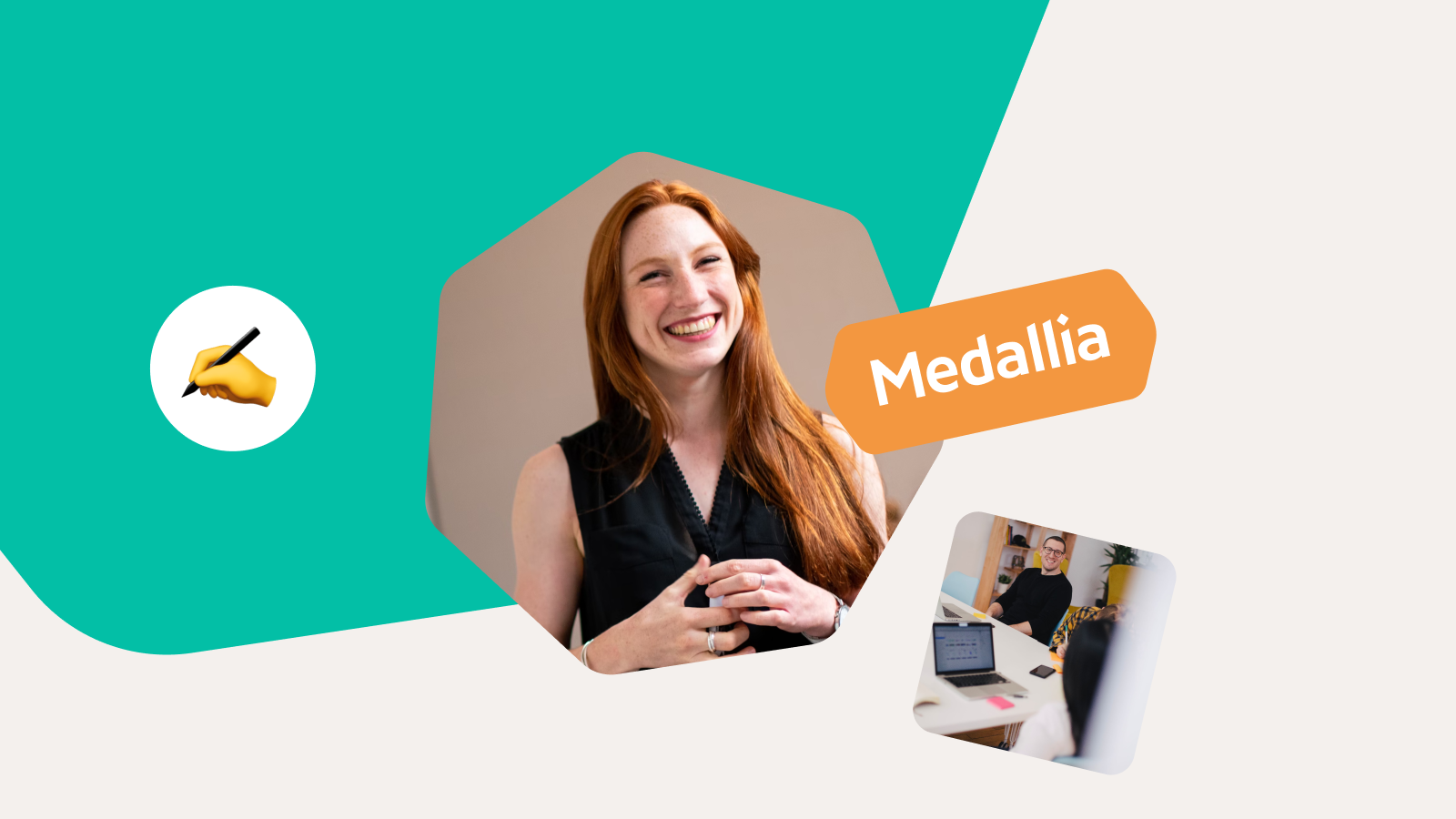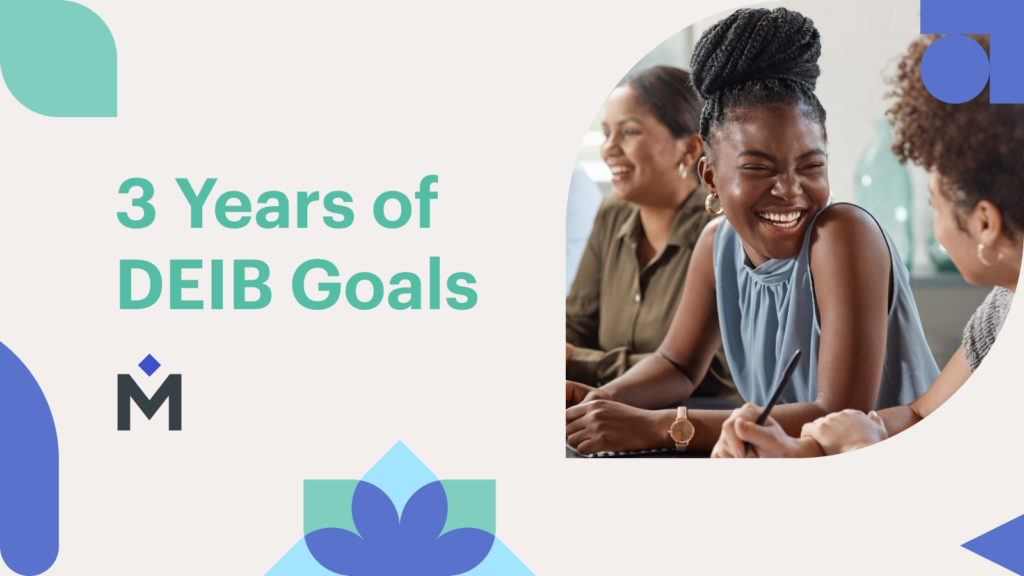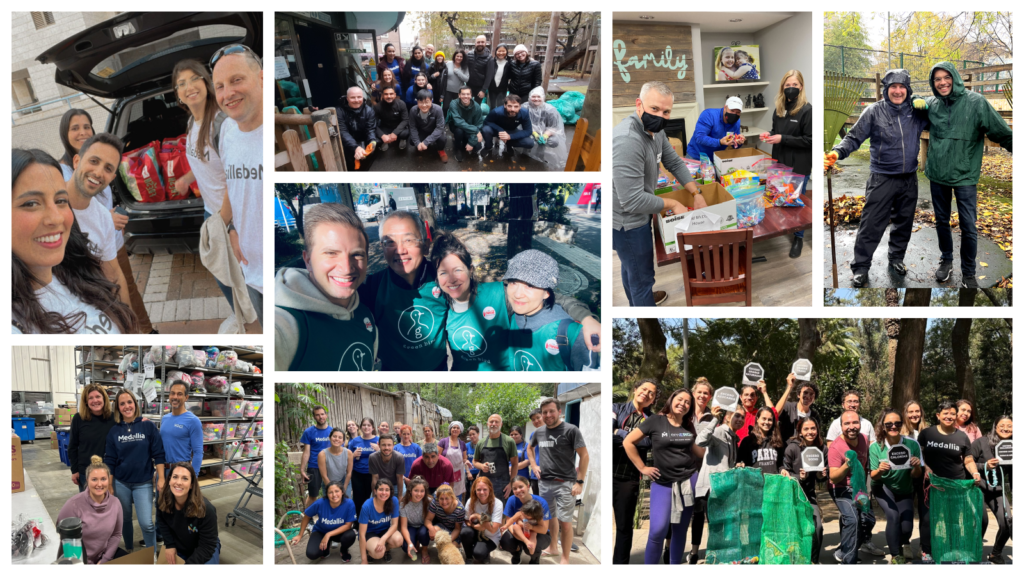Bringing People Together: How Medallia Built a Community-Driven DEIB Program
October 26, 2022
Medallia Culture
Overcoming inequality isn’t easy, but it’s also not impossible. Here are the ways we’re building belonging through action and accountability.
When it comes to diversity, equity, inclusion, and belonging (DEIB), actions speak louder than words. We believe that acknowledging inequality isn’t enough, but that we have to actively combat it and continue the work through action and accountability.
It’s been over two years since racial justice movements in the U.S. erupted after George Floyd was murdered by police. The palpable impact led to companies taking a stance and committing to do better by communities of color, both within and outside their organizations. Beyond this, the global community has continued to confront the realities of the pandemic, environmental disasters, economic crisis, and more social injustices.
Through it all, Medallia has been, and continues to be, guided by our values and our people.
As we continue to take action to advance DEIB initiatives in our workplaces, we have to continually examine, iterate, reimagine, and disrupt — all while using a constant feedback loop to learn from our successes and failures. We must continue to ask ourselves, as a workforce, what more can be achieved to keep moving towards progress?
Since we’ve built our DEIB program over the years, we’ve learned that it has to be operationalized throughout the business. That means using a DEIB lens to evaluate our leadership strategies, partnerships, social impact efforts, hiring systems, and employee experience data, as well as our products and how we use them.
Spoiler alert: none of this is possible without leadership buy-in. Leaders across an entire organization must be mobilized and dedicated to champion equity, because DEIB is everyone’s job. When leaders take responsibility for DEIB — as our leaders do at Medallia — instead of leaving it to underrepresented groups to solve alone, they send a message of its importance to the rest of the company.
We know this work isn’t easy. The good news: it’s not impossible. More good news: you don’t have to reinvent the wheel, because we’re sharing our learnings to help evolve your own DEIB program. Here are the six ways we’re building belonging (and you can too):
1. Accountability Through Transparent Reporting
Why?
The first step every organization must take is collecting data and then reporting on it. You can’t address problems without insight into your demographics and workforce.
What we’re doing
Medallia publishes our diversity data and reports on representation data for key groups (such as all employees, leadership, and executives) at a regular cadence to help everyone understand the makeup of the workforce and how it’s changing over time.
Another area where transparent reporting can be impactful is around an organization’s pay practices. As legal regulations are continuously shifting in this space, being proactive is a great way to build a solid foundation and ensure you’re well-positioned to respond to any new location-specific requirements that may arise.
For example, reporting on the adjusted and unadjusted pay gap for the organization by gender and race, having a third-party review and certification of the organization’s pay equity practice, and sharing pay ranges in job postings are great ways to set organizations up for success.
To that end, we published our UK Gender Pay Gap report. This builds on our Global Pay Equity commitment, which Medallia has maintained by conducting a pay equity analysis at least once annually since 2018.
This transparency has helped show us where we are today and hold ourselves accountable to our goals, while building trust internally and externally.
2. Investing in Our Communities
Why?
When we’re empowered to be our full selves, we thrive.
Having employee resource groups (ERGs) is a win for employee experience, as these groups are beneficial for fostering a community of shared interests and backgrounds. And they are a win for the business, as ERGs can support branding and recruiting efforts while informing business strategy.
What we’re doing
Too many companies rely on unsupported volunteers to lead these initiatives, leading to burn out and exacerbated concerns about belonging, which is counterintuitive to the purpose of ERGs.
We believe successful ERGs are only possible with continued investment. Our DEIB practice sponsors ten global and officially chartered ERGs, each with a healthy yearly budget of $25k to support their initiatives, programming, and philanthropy. In 2022, we launched an Executive Sponsorship program that is tied to our executive bonus plan. Through this program, executives spend time each quarter with the community they sponsor for development, mentorship, and coaching. This builds on our ERG Leader Recognition program, introduced in 2021, designed to recognize and compensate our community leaders for their valuable contributions to our culture.
This year we also hosted emERGe Week, our inaugural ERG summit focused on bringing Medallians into the communities we have, while promoting global awareness, engagement, and belonging.
3. Investing in Talent Community Partnerships
Why?
We believe that talent is everywhere. That is why we invest in organizations and nonprofits that connect talent from underrepresented groups and a variety of backgrounds. We also measure diversity in our candidate pipeline to ensure we’re able to make progress.
What we’re doing
We’re proud to partner with organizations like:
Year Up to close the opportunity divide by ensuring young adults gain the skills, experiences, and support that will empower them to reach their potential through careers and higher education.
BreakLine to help build an affordable path to compelling careers for high-potential individuals, including Veterans, women, and underrepresented minorities.
AfroTech to support the definitive conference that brings leaders in technology and business together to exchange ideas and build a strong Black tech community.
Lesbians Who Tech & Allies to be part of the largest LGBTQ professional community in the world.
Through measuring diversity in our talent pipeline, investing in these partnerships, and enabling our talent acquisition team, we have seen success:
- We have increased our Black employee population in the US from 1% in 2020 to over 6.5% in 2022, exceeding our first two years of progressive representation goals.
- We’ve grown our representation of women globally from 36% to over 38%, and women in leadership positions from 29% last year to 33% this year.
- Over 23% of new hires in FY22 identify as under-represented minorities (Black, Hispanic, or two or more races), up from 21% in FY21.
4. Connecting Sustainability and Social Impact to DEIB
Why?
Building connections between an organization’s sustainability, social impact, and DEIB initiatives is a great way to establish a cohesive ESG strategy. Too often, environmental and philanthropic efforts are tackled separately from DEIB, and they don’t acknowledge how they are deeply intertwined: for example, how those from marginalized communities are disproportionately impacted by pollution due to the legacy of policies like redlining.
Ideally, these initiatives will work together to reinforce one another and show how the organization is putting their values into action. By considering the relationship between their priorities in each space, organizations have an opportunity to make sure all their programs are more well-rounded, inclusive, and meaningful.
What we’re doing
While we empower Medallians to give back to any cause they are passionate about, we ensure every strategic initiative is focused on supporting marginalized communities and identities that are typically underrepresented in business. As a company that values every experience, we’re committed to helping create more equitable experiences across technology, healthcare, education, and humanitarian aid. We’ve donated $1.1m in product-value, volunteer hours, and funding to support over 50 nonprofits globally.
We’ve maintained our Juneteenth matching donation fund, with a $100k donation for 2022, after donating $200k in 2020 and $100k in 2021, to racial justice organizations selected by Black Medallians.
We’ve also supported organizations like Black Girls Smile, and continued our relationship with Black Girl Ventures, providing our Medallia Ideas product to their organization, and sponsoring their pitch competition this year.
5. Ongoing Education and Dialogue
Why?
In order to promote an inclusive environment that fosters belonging and equity, we deliver meaningful interpersonal education and dialogue opportunities on DEIB topics to all Medallians.
What we’re doing
We have continued to expand our educational offerings. After gathering feedback from our employees on our training programs, we now offer an interactive on-demand eLearning solution that includes micro-learnings and resources, and delivers this training at any time. We also invest in live learning opportunities for all Medallians throughout the year on topics including allyship skills, anti-racism, managing unconscious bias, and more.
We put the development of our employees first by way of mentorship, coaching, ERG-led workshops, and an ongoing town hall series featuring industry and subject matter experts who focus on historically left-out groups.
6. Employee Listening with an Ear for Equity
EX is of critical importance, and so is exploring your EX data with a demographic lens to ensure your employees are having equitable experiences. There should be a shift from “has everyone’s ideas been heard?” to “whose ideas won’t be taken as seriously because they aren’t in the majority?”
At Medallia, we use our own technology to assess workplace equity across all our different employee touchpoints. We enable a culture of listening and acting on feedback to continuously optimize employee experience and engagement.
Our technology enables us to measure employee experience in all areas including onboarding, work-life balance, benefits, growth and development, and manager relationships. We use the feedback from our employees to understand what is driving employee engagement and which investments we need to make to improve. (If you want to learn more about the intersection of EX and DEIB at Medallia, check out Building D&I Through Employee Insights from our solutions principal, Melissa Arronte.)
Building an Inclusive Workforce to Enact Meaningful Change
As we continue to push for progress, we believe that building an inclusive workforce that encourages and supports the diversity of our community is the only way forward. We will continue to work towards a world where all belong here through the dedication of our leaders and their commitment to programs and resources that advance DEIB goals.
We’re sharing our journey in hopes that others may be able to learn from our strategies to grow their own DEIB programs. Because we’re stronger together.
Medallia is growing and dedicated to “hiring the whole person.” Join the #MedalliaLife by heading to our careers page and applying today.






